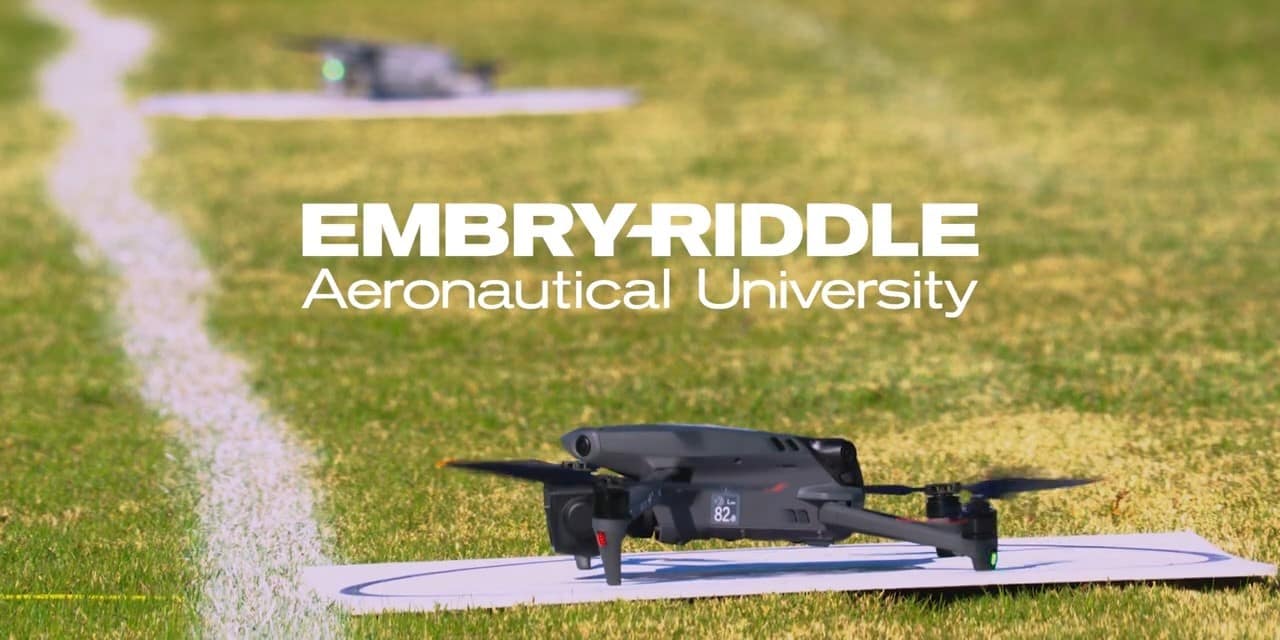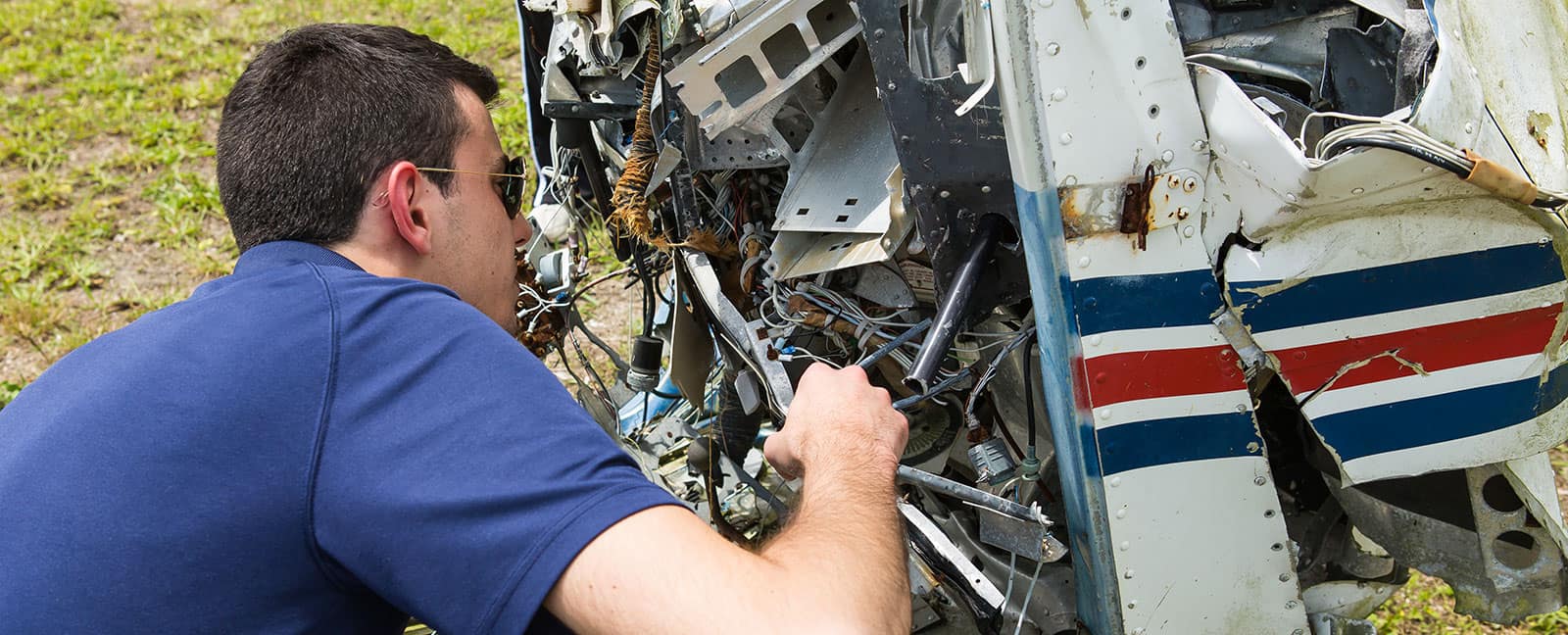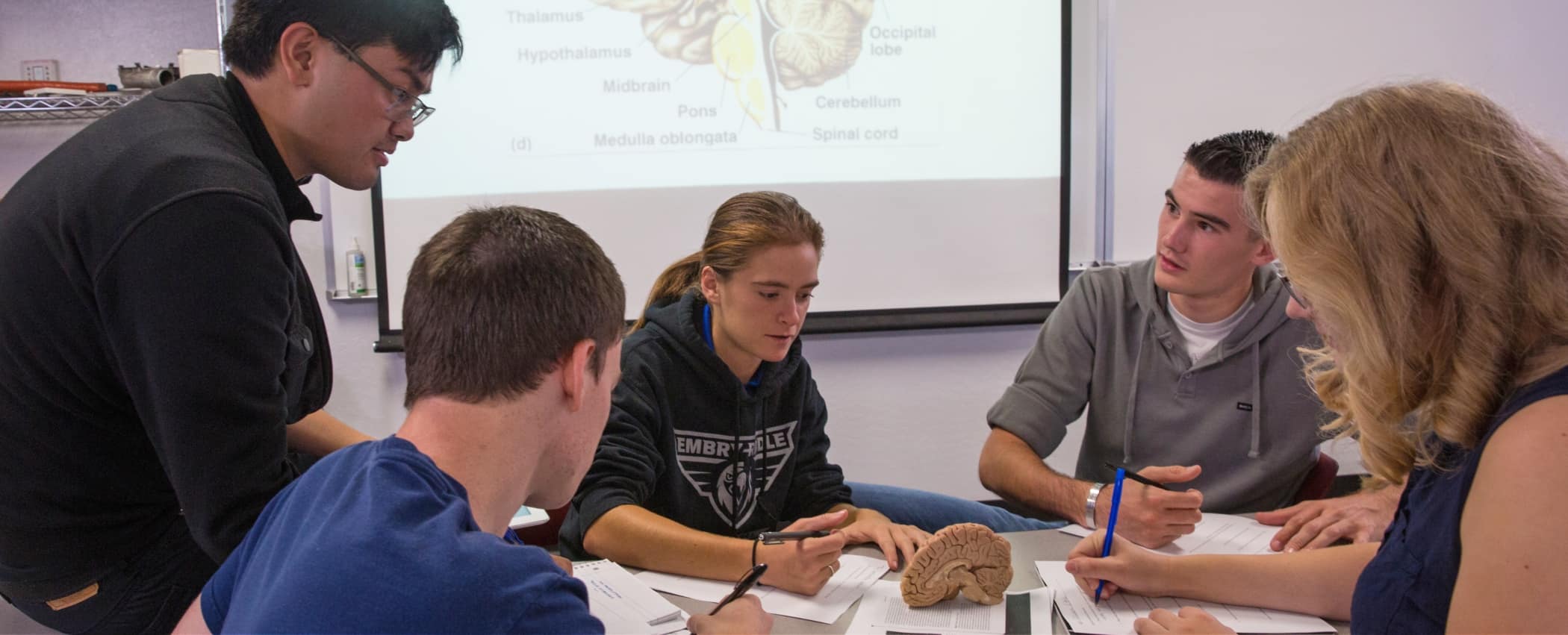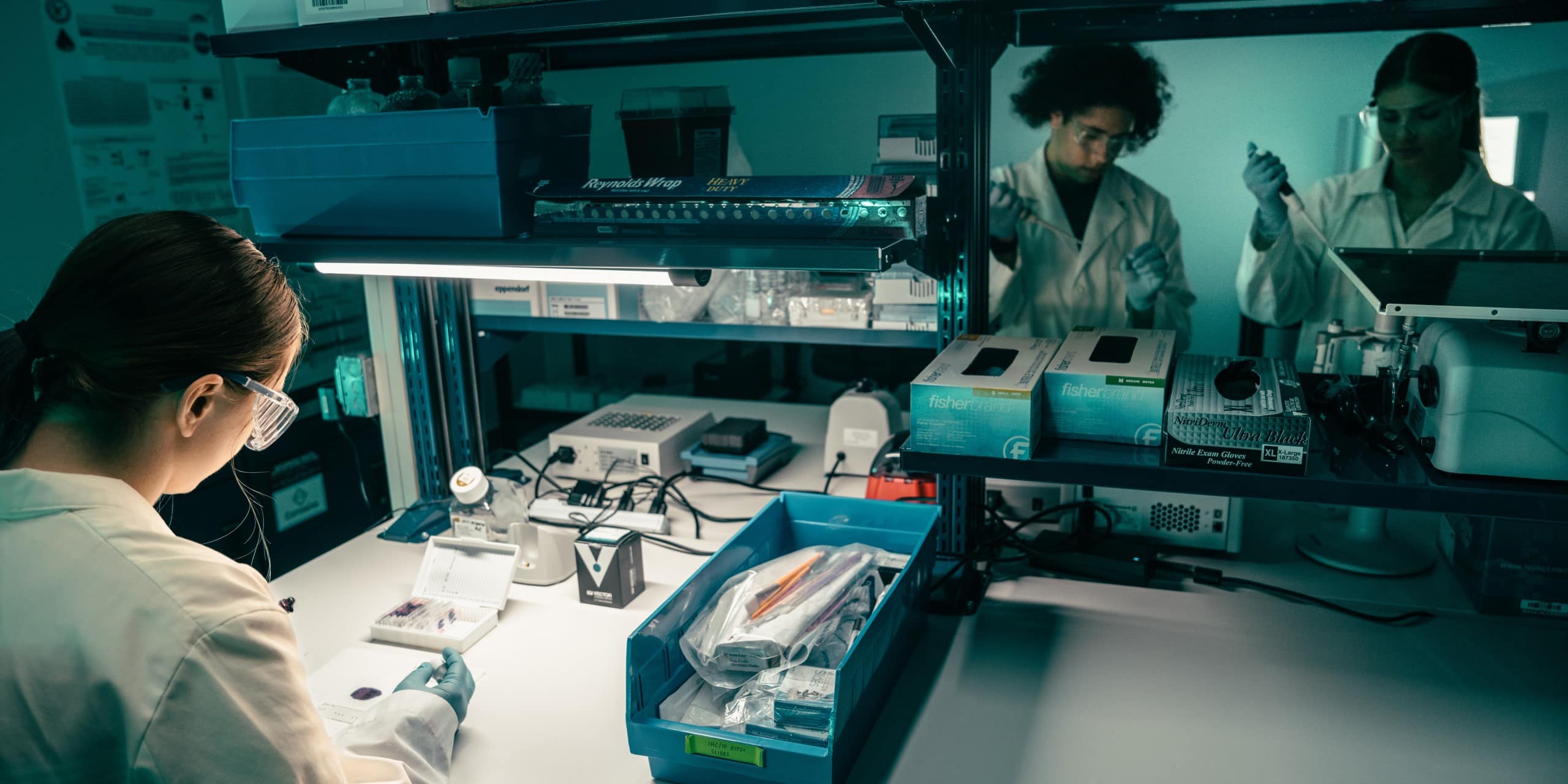
Bachelor of Science in
Human Factors Psychology
The Bachelor of Science in Human Factors Psychology prepares students to optimize human performance and safety through efficient processes and products.
About the Bachelor of Science in Human Factors Psychology
The Bachelor of Science in Human Factors Psychology equips students with the skills to create and improve products, equipment, machines and environments to complement human capabilities. Human Factors is a term that is often used interchangeably with user experience design, human-computer interaction (HCI), workplace ergonomics and human-systems integration (HSI).
Students who enroll in this program are given a solid foundation in human performance characteristics and system evaluation methodologies. Courses focus not only on aviation-related technology but a wide variety of industries, providing the best career opportunities after graduation.
Why You Should Study this Degree
Human factors psychology focuses on how people interact in their environment and how technology can work better with humans. A career in human factors may be for you if you:
- Enjoy designing reliable products
- Focus on human capabilities and errors
- Have a passion for creating training programs
- Like improving productivity and performance
Student Learning Outcomes
What you will learn while pursuing a degree in Human Factors Psychology:
- Apply basic human-machine system analysis and design methodologies to problems in various domains.
- Describe operational capabilities and limitations of human anatomy and physiology with emphasis on vision, audition and vestibular systems.
- Explain the internal information processing capabilities and limitations of human memory systems.
- Understand basic ergonomic factors and relate them to human machine system design and performance.
Human Factors Psychology Career Opportunities
Careers and Employers
Human factors psychology graduates secure roles in positions such as software interface design, user experience, system safety, training development and ergonomics.
Human Factors majors tend to enter the industry with companies such as:
- The Boeing Company
- Garmin
- Gulfstream Aerospace
- Honeywell
- MITRE
- NASA
- Northrop Grumman
- Rockwell Collins
Human Factors Psychology Salary Information (H3)
Graduates with a Bachelor of Science in Human Factors Psychology tend to receive competitive salaries, with an average income of $129,254 annually, as of 2024.
DETAILS
This offering is available at the following campuses. Select a campus to learn more.
About Human Factors Psychology at the Daytona Beach, FL Campus
The Bachelor of Science in Human Factors Psychology at Daytona Beach is part of the Department of Human Factors and Behavioral Neurobiology. Human Factors majors gain research experience from a systems perspective, reinforced through courses and hands-on lab experiences allowing them to achieve industry success.
The program is equipped with many state-of-the-art facilities such as the Aerospace Physiology Lab, Aviation Human Factors Lab, User Experience Lab (RUX), Applied Perception and Performance Lab and others. Students are taught to analyze the implications both human and machine characteristics have in the overall function of complex systems.
Embry‑Riddle offers two combined programs that allow qualified students the chance to begin graduate work toward their Master of Science in Human Factors or Master of Business Administration while completing their B.S. in Human Factors Psychology.
Human Factors Psychology Information
- Credits: 123
- Online or In-Person: In-Person
- Practicum: Practicum in Human Factors Psychology (3 Credits)
Helpful Links
- Tour our Daytona Beach Campus
- Discover the Department's Faculty
- Explore the Fields of Study: Engineering & Applied Science
- Find Related Clubs & Organizations
Student Learning Outcomes
Students will:
- Describe the basic characteristics of human anatomy, physiology, sensation, and perception, with emphasis on vision, audition, and vestibular systems.
- Describe the basic characteristics and limitations of human memory and cognition.
- Relate basic ergonomic and bioengineering factors to human-machine system design and performance.
- Critically evaluate scientific research.
- Interpret basic applied statistical analyses for the behavioral sciences.
- Apply basic experimental designs for the behavioral sciences.
- Apply human factors psychology principles to human-machine system performance in various domains.
- Apply human-machine system analysis and design methodologies across various domains.
- Function effectively in human factors and ergonomics team projects and demonstrate professional communication skills.
General Education Requirements
For a full description of Embry-Riddle General Education guidelines, please see the General Education section of this catalog. These minimum requirements are applicable to all degree programs.
| Communication Theory and Skills | 9 | |
| Humanities - Lower level | 3 | |
| Social Sciences - Lower level (PSY 101) | 3 | |
| Humanities or Social Sciences - Lower or Upper level | 3 | |
| Humanities or Social Sciences - Upper level | 3 | |
| Computer Science | 3 | |
| Mathematics | 6 | |
| Physical and Life Sciences (one course must include a laboratory) | 6 | |
| Total Credits | 36 | |
Embry-Riddle courses in general education may be chosen from those listed below, assuming prerequisites are met. Courses from other institutions are acceptable if they fall into these broad categories.
Core Requirements
| College Success | ||
| UNIV 101 | College Success | 1 |
| Advanced Communication | ||
| For the Advanced Communication requirement, Human Factors majors are required to take one Advanced Communication class for a total of three credits. This exists in addition to the nine credits (three classes) taken for the Communication General Education Requirement. | ||
| Select one of the following: | 3 | |
COM 320 | Mass Communication Law and Ethics | |
COM 322 | Aviation and Aerospace Communication | |
COM 350 | Environmental Communication | |
COM 360 | Public Relations | |
COM 362 | Communication and Organizational Culture | |
COM 364 | Visual Design | |
COM 412 | Advanced Technical Writing | |
COM 415 | Nonverbal Communication | |
COM 460 | Crisis Communication | |
HU 330 | Values and Ethics | |
HU 332 | Cross-Cultural Communication | |
HU 335 | Technology and Modern Civilization | |
HU 338 | Interdisciplinary Explorations | |
HU 363 | Communication and Society | |
HU 375 | The Nature of Language | |
HU 415 | Nonverbal Communication | |
| Computer Science | ||
| Six credit hours from any CS course or from the additional courses listed below. These courses are in addition to those taken as General Education. | ||
| Select two of the following: | 6 | |
BA 125 | Foundations in Business Data Analytics | |
BA 232 | Techniques in Business Analytics | |
CEC 220 | Digital Circuit Design | |
CEC 222 | Digital Circuit Design Laboratory | |
CYB 235 | Computer and Network Technologies | |
EGR 115 | Introduction to Computing for Engineers | |
EGR 120 | Graphical Communications | |
SE 300 | Software Engineering Practices | |
| Psychology and Human Factors | ||
| HF 300 | Human Factors I: Principles and Fundamentals | 3 |
| HF 302 | Human Factors II: Analytic Methods and Techniques | 4 |
| HF 307 | Human Factors III: Performance Processes | 3 |
| HF 307L | Human Factors III: Performance Processes Lab | 1 |
| HF 310 | Human-Computer Interaction | 3 |
| HF 312 | Ergonomics and Bioengineering | 3 |
| HF 400 | Human Factors IV: System Design | 4 |
| PSY 310 | Sensation and Perception | 3 |
| PSY 312 | Research Analysis in Psychology | 4 |
| PSY 315 | Cognitive Psychology | 3 |
| PSY 323 | Research Design | 3 |
| PSY 323L | Research Methods Laboratory | 1 |
| PSY 335 | Physiological Psychology | 3 |
| Practicum | ||
| HF 490 | Practicum in Human Factors Psychology | 3 |
| Total Credits | 51 | |
Specified Electives
Take three courses from each of the following two groups of courses (18 credit hours total).
| Group I: Applied Systems in Human Factors | 9 | |
HF 315 | Automation and Systems Issues in Aviation | |
HF 321 | Psychopharmacology | |
HF 325 | Human Factors and System Safety | |
HF 326 | Human Performance in Extreme Environments | |
HF 330 | Human Factors in Space | |
HF 352 | Human Factors in Entertainment Systems | |
HF 410 | Human Factors Engineering: Crew Station Design | |
HF 412 | Simulating Humans in Complex Systems | |
HF 415 | Human Factors in Simulation Systems | |
HF 422 | Applied Ergonomic Design, Analysis, and Evaluation | |
HF 440 | Aerospace Physiology | |
| Group II: Psychological Foundations of Human Factors | 9 | |
PSY 320 | Aviation Psychology | |
PSY 330 | Learning and Motivation | |
PSY 340 | Industrial-Organizational Psychology | |
PSY 345 | Training and Development | |
PSY 350 | Social Psychology | |
PSY 352 | Personality: A Systems Approach | |
PSY 354 | Developmental Psychology | |
PSY 365 | Abnormal Psychology | |
Other courses with approval of advisor. | ||
| Total Specified Elective Credits | 18 | |
| Open Elective Credits | 18 | |
| Total Elective Credits | 36 | |
| Total Degree Credits | 123 | |
Suggested Plan of Study
Students should be aware that several courses in each academic year may have prerequisites and/or co-requisites. Please check the course descriptions at the back of this catalog before registering for classes to ensure requisite sequencing.
| Year One | ||
|---|---|---|
| Credits | ||
| UNIV 101 | College Success | 1 |
| COM 122 | English Composition | 3 |
| COM 219 | Speech | 3 |
| CS 120 | Introduction to Computing in Aviation | 3 |
| HU 14x Lower Level Humanities | 3 | |
| MA 111 | Pre-Calculus for Aviation | 3 |
| MA 112 | Applied Calculus for Aviation | 3 |
| BIO 120 Foundations of Biology I OR CHM 101 Basic Chemistry OR PS 113 Introductory Physics I | 3 | |
| BIO 120L Foundations of Biology I Lab OR CHM 101L Basic Chemistry Lab or PS 113L Introductory Physics I Lab | 0-1 | |
| PSY 101 | Introduction to Psychology | 3 |
| HF 300 | Human Factors I: Principles and Fundamentals | 3 |
| Credits Subtotal | 28.0-29.0 | |
| Year Two | ||
| COM 221 | Technical Report Writing | 3 |
| HF 302 | Human Factors II: Analytic Methods and Techniques | 4 |
| PSY 312 | Research Analysis in Psychology | 4 |
| PSY 312L | Research Analysis in Psychology Laboratory | 0 |
| PSY 335 | Physiological Psychology | 3 |
| HU/SS Upper or Lower Level Elective | 3 | |
| Physical Science Elective | 3 | |
| Computer Science Elective for HF | 3 | |
| HF/PSY Specified Elective | 3 | |
| Open Electives | 6 | |
| Credits Subtotal | 32.0 | |
| Year Three | ||
| HF 307 | Human Factors III: Performance Processes | 3 |
| HF 307L | Human Factors III: Performance Processes Lab | 1 |
| HF 310 | Human-Computer Interaction | 3 |
| HF 312 | Ergonomics and Bioengineering | 3 |
| HF 490 | Practicum in Human Factors Psychology | 3 |
| PSY 323 | Research Design | 3 |
| PSY 323L | Research Methods Laboratory | 1 |
| HF/PSY Specified Elective | 3 | |
| Computer Science Elective for HF | 3 | |
| HU/SS Upper-Level Elective | 3 | |
| Open Electives | 6 | |
| Credits Subtotal | 32.0 | |
| Year Four | ||
| HF 400 | Human Factors IV: System Design | 4 |
| PSY 315 | Cognitive Psychology | 3 |
| PSY 310 | Sensation and Perception | 3 |
| HF/PSY Specified Electives | 12 | |
| Advanced COM/HU Elective for HF | 3 | |
| Open Electives | 6 | |
| Credits Subtotal | 31.0 | |
| Credits Total: | 123.0-124.0 | |
Get Started Now:
Summary
123 Credits
Estimate your tuition by using the Tuition Calculator
View Financial Aid Information
Learn about our General Education
Find out about transferring credits to this degree
Learn more about our Veterans & Military benefits
View our Academic Calendar

Spotlight
About Human Factors Psychology at the Prescott, AZ Campus
The Bachelor of Science in Human Factors Psychology, housed in the College of Arts & Sciences, focuses on human behavior, ergonomics, user experience design and cognitive engineering. Human Factors majors obtain the skills required to conduct, design and apply human factors research to the evaluation of simple and complex systems.
One of the few schools that offers undergraduate programs in Human Factors Psychology, Embry-Riddle allows students to explore the applications of human factors principles in different domains through unique courses, such as the Psychology of Gaming and Aviation Psychology. At the Prescott Campus, students can gain hands-on experience working on multidisciplinary teams in labs such as the Human Factors/Ergonomics Lab, the Simulation Science Games and Animation Lab and the Robertson Aircraft Accident Investigation Crash Lab.
Embry‑Riddle offers a combined program that allows qualified students the chance to begin graduate work toward their Master of Science in Human Factors from our online Worldwide Campus while completing their B.S. in Human Factors Psychology.
Human Factors Psychology Information
- Credits: 123
- Online or In-Person: In-Person
- Capstone: Capstone in Psychology (3 Credits)
Helpful Links
- Tour our Prescott Campus
- Discover the Department's Faculty
- Explore the Fields of Study: Engineering & Applied Science
- Find Related Clubs & Organizations
Student Learning Outcomes
Students will:
- Describe the basic characteristics of human anatomy, physiology, sensation, and perception, with emphasis on vision, audition, and vestibular systems.
- Describe the basic characteristics and limitations of human memory and cognition.
- Relate basic ergonomic and bioengineering factors to human-machine system design and performance.
- Critically evaluate scientific research.
- Interpret basic applied statistical analyses for the behavioral sciences.
- Apply basic experimental designs for the behavioral sciences.
- Apply human factors psychology principles to human-machine system performance in various domains.
- Apply human-machine system analysis and design methodologies across various domains.
- Function effectively in human factors and ergonomics team projects and demonstrate professional communication skills.
Degree Requirements
The Bachelor of Science in Human Factors Psychology can be earned in eight semesters, assuming appropriate background and full-time enrollment. Successful completion of 120 credit hours is required, with a CGPA of 2.0 or higher.
Students are encouraged to choose a minor field of study, such as Aviation Safety.
Students will be encouraged to have an applied practicum experience. This requirement may be fulfilled in several ways, including co-ops, internships, or working on an on-campus research team. Practicums provide opportunities to gain practical experience in real-world settings. A practicum experience is highly regarded by employers and increases the student’s employment potential after graduation. Typically, students will engage in practical experience activities toward the end of the degree program so they can take maximum advantage of their undergraduate
Program Requirements
General Education
Embry-Riddle degree programs require students to complete a minimum of 36 hours of General Education coursework. For a full description of Embry-Riddle General Education guidelines, please see the General Education section of this catalog.
Students may choose other classes outside of their requirements, but doing so can result in the student having to complete more than the degree's 120 credit hours. This will result in additional time and cost to the student.
| Communication Theory and Skills | 9 | |
| Computer Science/Information Technology | 3 | |
| Mathematics | 6 | |
| Physical and Life Sciences (Natural Sciences) | 6 | |
| Humanities and Social Sciences | 12 | |
3 hours of lower-level Humanities | ||
3 hours of lower-level Social Science | ||
3 hours of lower-level or upper-level Humanities or Social Science | ||
3 hours of upper-level Humanities or Social Science | ||
| Total Credits | 36 | |
Human Factors Psychology Core (96 Credits)
The following course of study outlines the quickest and most cost-efficient route for students to earn their B.S. in Human Factors Psychology. Students are encouraged to follow the course of study to ensure they complete all program required courses and their prerequisites within four years.
Courses in the core with a # will satisfy general education requirements.
| Computer Science Elective (includes CS, IT, SIM, DS prefixes) | 6 | |
| General Education - Communication Theory and Skills # | 9 | |
| General Education - Computer Science or Information Technology Elective # | 3 | |
| General Education - lower-level Humanities # | 3 | |
| General Education - lower-level or upper-level Humanities or Social Science # | 3 | |
| General Education - upper-level Humanities or Social Science # | 3 | |
| General Education - Mathematics Electives # | 6 | |
| General Education - Physical and Life Sciences (Natural Sciences) Elective # | 3 | |
| General Education - Physical and Life Sciences (Natural Sciences) with Lab Elective # | 3 | |
| HF 300 | Human Factors I: Principles and Fundamentals * | 3 |
| HF 302 | Human Factors II: Analytic Methods and Techniques ** | 4 |
| HF 306 | Human Factors III: Performance Processes * | 4 |
| HF 310 | Human-Computer Interaction | 3 |
| HF 312 | Ergonomics and Bioengineering | 3 |
| HF 400 | Human Factors IV: System Design | 4 |
| PSY 101 | Introduction to Psychology # | 3 |
| or PSY 222 | Introduction to Industrial/Organizational Psychology | |
| PSY 103 | Professional Development in Psychology | 1 |
| PSY 226 | Statistics for Organizational Analysis and Research **^ | 3 |
| PSY 311 | Sensation, Perception, and Cognition * | 3 |
| or PSY 315 | Cognitive Psychology | |
| PSY 320 | Aviation Psychology ** | 3 |
| PSY 321 | Psychology of Gaming | 3 |
| PSY 322 | Research Design *^ | 4 |
| PSY 335 | Physiological Psychology * | 3 |
| PSY 345 | Training and Development ** | 3 |
| PSY 410 | Personnel Selection and Assessment ** | 3 |
| PSY 494 | Tests and Measurements Theory * | 3 |
| PSY 496 | Capstone in Psychology * | 3 |
| UNIV 101 | College Success | 1 |
| Total Credits | 96 | |
Specified Electives (9 Credits)
| PSY 222 | Introduction to Industrial/Organizational Psychology * | 3 |
| PSY 306 | Psychology of Deception Detection * | 3 |
| PSY 313 | Personality and Profiling ** | 3 |
| PSY 336 | Forensic Psychology | 3 |
| PSY 337 | Criminality | 3 |
| PSY 350 | Social Psychology ** | 3 |
| PSY 365 | Abnormal Psychology * | 3 |
| PSY 370 | Occupational Health & Performance | 3 |
| PSY 401 | Psychology of Leadership * | 3 |
| SF 326 | System Safety | 3 |
| SF 410 | Industrial Safety and Health | 3 |
| SF 415 | Human Reliability and Safety Analysis | 3 |
| SF 420 | Analysis of Observational Data | 3 |
| SF 440 | Construction Safety and Health | 3 |
Open Elective (15 Credits)
| Open Electives | 15 | |
| Total Credits | 120 | |
- *
Offered in Fall Only
- **
Offered in Spring Only
- #
General Education Courses
- ^
PSY 226 and PSY 322 are rigorous, foundational courses in the field of psychological sciences. Therefore, both must be taken at ERAU to ensure students receive the highest quality of instruction, as well as benefit from the university's unique academic resources.
All Army ROTC students are required to complete SS 321 - U.S. Military History 1900-Present (3 credits) in order to commission.
Suggested Plan of Study
| Freshman Year | ||
|---|---|---|
| Fall | Credits | |
| COM 122 | English Composition | 3 |
| Computer Science/Information Technology Elective | 3 | |
| Mathematics Elective | 3 | |
| Open Elective | 3 | |
| PSY 101 | Introduction to Psychology | 3 |
or PSY 222
|
Introduction to Industrial/Organizational Psychology | |
| UNIV 101 | College Success | 1 |
| Credits Subtotal | 16.0 | |
| Spring | ||
| Computer Science/Information Technology Elective | 3 | |
| Humanities Lower-Level Elective | 3 | |
| Mathematics Elective | 3 | |
| Natural Science Elective with Lab | 3 | |
| PSY 103 | Professional Development in Psychology | 1 |
| PSY 320 | Aviation Psychology | 3 |
| Credits Subtotal | 16.0 | |
| Sophomore Year | ||
| Fall | ||
| Communications Elective | 3 | |
| Computer Science/Information Technology Elective | 3 | |
| HF 300 | Human Factors I: Principles and Fundamentals | 3 |
| PSY 311 | Sensation, Perception, and Cognition | 3 |
or PSY 315
|
Cognitive Psychology | |
| Open Elective | 3 | |
| Credits Subtotal | 15.0 | |
| Spring | ||
| Communications Elective | 3 | |
| HF 312 | Ergonomics and Bioengineering | 3 |
or HF 310
|
Human-Computer Interaction | |
| Natural Science Elective | 3 | |
| Open Elective | 3 | |
| PSY 226 | Statistics for Organizational Analysis and Research | 3 |
| Credits Subtotal | 15.0 | |
| Junior Year | ||
| Fall | ||
| HF 306 | Human Factors III: Performance Processes | 4 |
or HF 302
|
Human Factors II: Analytic Methods and Techniques | |
| Open Elective | 3 | |
| PSY 322 | Research Design | 4 |
| PSY 335 | Physiological Psychology | 3 |
| Specified Elective | 3 | |
| Credits Subtotal | 17.0 | |
| Spring | ||
| HF 312 | Ergonomics and Bioengineering | 3 |
or HF 310
|
Human-Computer Interaction | |
| HF 400 | Human Factors IV: System Design | 4 |
or PSY 321
|
Psychology of Gaming | |
| Humanities/ Social Science Upper-Level Elective | 3 | |
| Open Elective | 3 | |
| PSY 410 | Personnel Selection and Assessment | 3 |
or PSY 345
|
Training and Development | |
| Credits Subtotal | 16.0 | |
| Senior Year | ||
| Fall | ||
| PSY 494 | Tests and Measurements Theory | 3 |
| PSY 496 | Capstone in Psychology | 3 |
| HF 306 | Human Factors III: Performance Processes | 4 |
or HF 302
|
Human Factors II: Analytic Methods and Techniques | |
| Specified Elective | 3 | |
| Credits Subtotal | 13.0 | |
| Spring | ||
| Humanities or Social Sciences Upper-Level Elective | 3 | |
| PSY 410 | Personnel Selection and Assessment | 3 |
or PSY 345
|
Training and Development | |
| HF 400 | Human Factors IV: System Design | 4 |
or PSY 321
|
Psychology of Gaming | |
| Specified Elective | 3 | |
| Credits Subtotal | 13.0 | |
| Credits Total: | 120 | |
Get Started Now:
Summary
123 Credits
Estimate your tuition by using the Tuition Calculator
View Financial Aid Information
Learn about our General Education
Find out about transferring credits to this degree
Learn more about our Veterans & Military benefits
View our Academic Calendar

Spotlight
About Human Factors Psychology at the Worldwide & Online Campus
The Bachelor of Science in Human Factors Psychology at the Worldwide/Online Campus focuses on the knowledge used to guide decisions for the design, use, maintenance and improvement of systems that rely on human interactions.
The complete human factors cycle approach focuses on the fact that a broad range of professional areas benefit from human factors psychology, including artificial intelligence, aviation, ergonomics, human-systems integration, safety, simulation and robotics. This program helps ensure that future professionals are equipped with the necessary skills and knowledge to innovate and improve human-system interactions.
The online program is unique due to its ability to customize flexible learning experiences for students and make them better prepared in user experience design. Students will be provided opportunities to gain practical experience in real-world settings to increase career/career progression readiness upon graduation, including applied practicums, internships or virtual research teams.
Embry‑Riddle offers a combined program that allows qualified students the chance to begin graduate work toward their Master of Science in Human Factors while completing their B.S. in Human Factors Psychology.
Tracks/Specialties and/or Certificates
There are three specializations available to students in Human Factors, two of which are chosen as part of the Human Factors program:
- Psychological Foundations of Human Factors (18 credits)
- Organizational Behavior and Leadership (18 credits)
- Safety (18 credits)
Human Factors Psychology Information
- Credits: 120
- Online or In-Person: Fully online
Helpful Links
- Attend a Worldwide Virtual Info Session
- Discover the Department's Faculty
- Explore the Fields of Study: Engineering & Applied Science
- Find Related Clubs & Organizations
Student Learning Outcomes
Students will:
- Describe the basic characteristics of human anatomy, physiology, sensation, and perception, with emphasis on vision, audition, and vestibular systems.
- Describe the basic characteristics and limitations of human memory and cognition.
- Relate basic ergonomic and bioengineering factors to human-machine system design and performance.
- Critically evaluate scientific research.
- Interpret basic applied statistical analyses for the behavioral sciences.
- Apply basic experimental designs for the behavioral sciences.
- Apply human factors psychology principles to human-machine system performance in various domains.
- Apply human-machine system analysis and design methodologies across various domains.
- Function effectively in human factors and ergonomics team projects and demonstrate professional communication skills.
DEGREE REQUIREMENTS
General Education
| General Education | ||
| Embry-Riddle courses in the general education categories of Communication Theory and Skills, Humanities, Social Sciences, Physical and Life Science, Mathematics, and Computer Science may be chosen from as listed, assuming prerequisites are met. Courses from other institutions are acceptable if they fall into these broad categories and are at the level specified. | ||
| Communication Theory and Skills | 9 | |
| Computer Science/Information Technology | 3 | |
| Mathematics | 6 | |
| Physical and Life Sciences (Natural Sciences) | 6 | |
| Humanities and Social Sciences | 12 | |
Lower-Level Humanities | ||
Lower-Level Social Science | ||
Lower-Level or Upper-Level Humanities or Social Science | ||
Upper-Level Humanities or Social Science | ||
| Total Credits | 36 | |
Core/Major
| Human Factors Core | ||
| BSHF 300 | Human Factors I: Principles and Fundamentals | 3 |
| BSHF 302 | Human Factors II: Analytic Methods and Techniques | 3 |
| BSHF 307 | Human Factors III: Performance Processes | 3 |
| Culminating Experience (Select One): | 3 | |
BSHF 401 | Applied Research | |
BSHF 480 | Human Factors Capstone | |
COIN 496 | Co-Operative Education | |
| Total Credits | 12 | |
| Additional Core (Program Support) | ||
| RSCH 202 | Introduction to Research Methods | 3 |
| STAT 211 | Statistics with Aviation Applications | 3 |
| PSYC 310 | Sensation and Perception | 3 |
| PSYC 315 | Cognitive Psychology | 3 |
| Total Credits | 12 | |
| Program Specialization | 36 | |
| Choose two specializations | ||
Electives
| Specified Electives | ||
| COMD 225 | Science and Technology Communication | 3 |
| COMD 322 | Aviation and Aerospace Communication | 3 |
| COMD 335 | Technology and Modern Civilization | 3 |
| HUMN 330 | Values and Ethics | 3 |
| or MGMT 201 | Principles of Management | |
| RSCH 350 | Research Ethics | 3 |
| or SOCI 210 | Introduction to Sociology | |
| SOCI 499 | Special Topics/Social Science | 3 |
| Total Credits | 18 | |
| Open Electives | 6 | |
| Total Degree Requirements | 120 | |
Program Specializations:
Psychological Foundations of Human Factors
| PSYC 220 | Introduction to Psychology | 3 |
| Select 5 courses from the following: | 15 | |
PSYC 320 | Aviation Psychology | |
PSYC 326 | Group and Team Behavior | |
PSYC 340 | Industrial/Organizational Psychology | |
PSYC 350 | Social Psychology | |
PSYC 355 | The Psychology of Creativity and Innovation | |
PSYC 360 | Cultural Psychology | |
PSYC 400 | Introduction to Cognitive Science | |
PSYC 440 | The Psychology of Resilience | |
| Total Credits | 18 | |
Safety
| Select 6 of the following: | 18 | |
SFTY 201 | Introduction to Occupational Safety and Health | |
SFTY 205 | Principles of Accident Investigation | |
SFTY 311 | Fundamentals of Occupational Safety and Health | |
BSAS 320 | Human Factors in Aviation Safety | |
SFTY 321 | Ergonomics | |
SFTY 326 | System Safety | |
SFTY 341 | Occupational Safety and Health Program Management | |
SFTY 415 | Human Reliability and Safety Analysis | |
SFTY 421 | Ergonomics II | |
| Total Credits | 18 | |
Organizational Behavior and Leadership
| OBLD 275 | Critical Thinking for Leadership | 3 |
| Select 5 of the following: | 15 | |
OBLD 300 | Emotional, Social, and Cognitive Intelligence | |
OBLD 304 | Coaching and Mentoring | |
OBLD 310 | Mediation, Negotiation, and Conflict Resolution | |
OBLD 315 | Contemporary Leadership Theories | |
OBLD 317 | Organizational Behavior | |
OBLD 371 | Leadership | |
OBLD 407 | Driving Change in Organizations | |
OBLD 427 | Management of the Multicultural Workforce | |
| Total Credits | 18 | |
Get Started Now:
Summary
120 Credits
Estimate your tuition by using the Tuition Calculator
View Financial Aid Information
Learn more about the benefits of an Online Degree
Learn about our General Education
Find out about transferring credits to this degree
Learn more about our Veterans & Military benefits
View our Academic Calendar
Search Courses for this degree

RELATED DEGREES
You may be interested in the following degrees:






